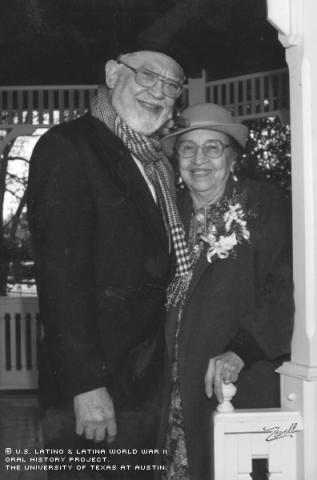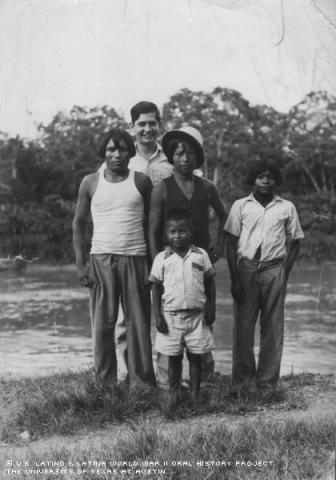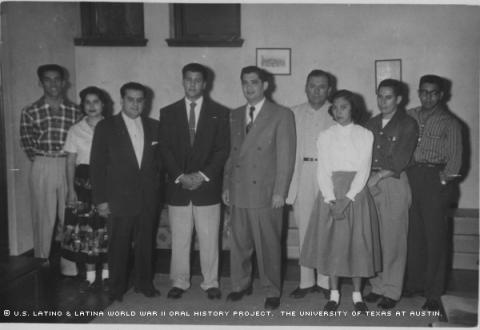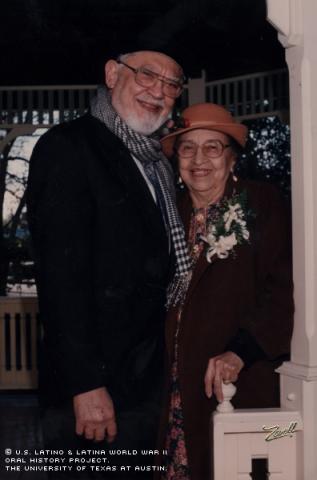



By Celina Moreno
Jose Ruben Moreno attributes his success in life to a journey on the "line of least resistance." But enduring economic hardship and performing dangerous wartime duties as a counterintelligence spy in Panama proved anything but effortless.
Moreno was born in 1917 to Melchor Moreno and Lydia Saldivar in Brownsville, Texas. He attended a Catholic school to avoid the Protestant-run public schools, to which his parents had an aversion. At the school, courses were conducted in Spanish the first three years and thereafter primarily in English.
"The Catholic school was the poorest excuse for a school you can ever imagine," he said. "They didn't attempt to teach anything except religion."
Despite disappointment with his schooling, Moreno learned about philosophy, religion, history and finance from daily talks with his father, who was a self-taught man.
By the time Moreno turned 13, his father had suffered from blindness and a stroke, leaving the family without a breadwinner and entrenched in poverty. Moreno, the oldest child, sold hens and plants to help his mother support his two sisters and three brothers.
At age 12, Moreno experienced "an opportunity of a lifetime" when his uncle, Julian Saldivar, brought him to Austin in 1929. He enrolled in the seventh grade at John T. Allen Junior High School, which was attended by children of the city's upper-class. Moreno said the school's science program was so impressive that later, as an instructor at the University of Texas at Austin's pharmacy school, he partly taught from material he’d learned there.
"The school was like a Harvard," he said.
His Austin schooling was cut short, however, when he stepped aside to allow four cousins the same opportunity to live there with his uncle. He returned to Brownsville, but his dissatisfaction with the city's schools, coupled with a need to help support his family, prompted him to drop out of the eighth grade.
He would spend the next three years working as a shoeshine boy. Even though he wasn’t in school, he retained intellectual curiosity, particularly a love of science. Introduced to the works of Charles Darwin by a friend, he began to study the scientist's theory of evolution in his spare time.
He also read the entire Bible in Spanish in three months. Having been exposed to both science and religion, he abandoned his faith, calling himself "a man of reason" while still a teenager.
During the Great Depression, the Moreno family sold its home for $200, moving to Austin to join Moreno's younger brothers, who were attending UT-Austin. Shortly after arriving, he secured a job as personal secretary for Carlos Castañeda, a renowned UT-Austin professor of Spanish, history and Latin American Studies.
"I said, 'I'm Jose Moreno, I want to attend the university, I don't have any money and I'm looking for a job,'" Moreno recalled. "And Castañeda replied, 'Start working.'"
Moreno enrolled in the university in 1939, following his brothers' footsteps and studying pharmacy using their hand-me-down textbooks.
For lack of money, "that was the only choice I had," Moreno said.
By the time the United States entered the war, Moreno was a third-year pharmacy student under deferment. But as the war escalated, he volunteered.
He underwent basic training near Fort Sam Houston, Texas, and was later stationed at Camp Barkeley near Abilene, Texas, where he worked in the payroll department.
"I stood guard over a couple of million dollars in a shack, and the money was on the floor in shoe boxes," he said. "Imagine walking over all that money!"
He was later promoted to Sergeant, and his salary skyrocketed from $21 to $200 a month.
Because of his education and bilingualism, he was sent to intelligence school in Chicago, where he helped the police department pursue gangsters. He was later sent to Panama as a secret agent, assigned to protect the Panama Canal Zone through counterespionage. His duties included interviewing and cultivating informants as well as conducting background checks and street surveillance.
When a German U-boat sank an Allied ship between Colombia and Panama, Moreno was sent to pump information from the only witness, a Colombian ship captain he interviewed at a cabaret. Moreno spent most of his early days at cabarets as an agent, watching for people contacting the female entertainers -- notorious as couriers for spies.
"I was making friends with the cabaret girls, cultivating them as informants, buying them drinks, sitting with them ... whatever was necessary," he said.
On one occasion, an alleged German spy, posing as a buyer of wild animals, asked Moreno to work for him among the natives in the Panamanian jungles. His superiors ordered him to accept.
As the war waned, Special Agent Moreno was transferred to David, Panama, where he became an "open agent," shedding his aliases and working closely with the Panamanian police. There, he met his future bride, Brigida Falcón, a Panamanian nurse he’d hired to perform cavity searches on women suspected of contraband.
Moreno, whose birthday falls on Panama's Independence Day, found his match in Falcón, whose birthday is July 4. The couple married and had a son before moving back to Austin.
After his October 23, 1945, discharge at the rank of Staff Sergeant, Moreno resumed his studies, earning an undergraduate pharmacy degree. Before graduating, he was offered a faculty teaching position by Henry Burlidge, former dean of the Pharmacy School.
Although he never received a doctorate, Moreno taught a couple of decades at UT-Austin, while investing in real estate and raising four sons.
After the war, Moreno held many positions with the League of United Latin American Citizens, including district governor, and helped start two chapters – one at UT-Austin and the other in San Marcos. He also participated in the G.I. Forum, the Anti-Defamation League and in politics.
Moreno says his wartime experiences represented a transformation for him.
"I was a barrio boy," he said. "I became elite."
Mr. Moreno was interviewed in San Antonio, Texas, on April 20, 2002, by Celina Moreno.

